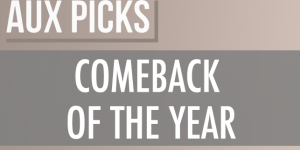 Music
Music
11 Francophone releases from 2014 you should listen to
by Jean-Étienne Sheehy
December 15, 2014
In the French music world, 2014 is the year of grand comebacks (allo Serge Fiori), indie pop triumphs (coucou Alex Nevsky), and mainstream crossovers (no offence, Louis-Jean Cormier). From bottom to top, here are 11 of our favourite Francophone releases from the past year.
Les Marinellis
Les Marinellis
(Burger Records / P. Trash Records)
On their self-titled album, the Montreal-based herd of freaks craft memorable yé-yé influenced rock with garage ambitions. The French aesthetics of the twelve songs are not a barrier to the band’s raw brashness. Instead, Les Marinellis provide the soundtrack to both the party and the hangover. There ain’t no party like a Marinellis party, mon enfant.
Poni
Poni
(Costume Records)
The four members of Poni have an impressive resume in the Montreal music scene, but this doesn’t endanger the cred of their stoner roots-rock endeavour. Poni’s debut removes the side-project label from the band and wears its Queb-influences on its sleeves, both when rocking out on college-radio jams (“Crochi”) or creating dense, roots-leaning atmospheres (“Bordel”).
Oktoplut
Pansements
(Slam Disques)
Oktoplut is a complex sludge-punk machine. The two-piece band operates at a level superior to the other French attempts at creating tenebrous and massive songs (“La terre ferme vs le vide”). In the meantime, we’re dealing with a formidable hook factory (“Sans compromis”). Oktoplut succeeds at owning their linguistic roots while making sure that every riff is delivered with the intensity required (“Vente de billet”).
Jesuslesfilles
Le grain d’or
(Independent)
When Jesuslesfilles released their debut in 2010, the band filled a void by taking the risk to write noisy garage pop en français. This pays off on their sophomore album, Le grain d’or, through the chaotic guitar tones, duelling vocals, and rigid drumming. In less than 25 minutes, Jesuslesfilles avoid all the stylistic traps of garage rock, while remaining urgent and fun.
Bernhari
Bernhari
(Audiogram)
Bernhari’s music is made to be cried to. The universal characteristic of sadness is embraced fully, with the use of shoegaze and chanson française influences. Bernhari is romantic, but his ability to be realist and naive at the same time shapes his universe. This debut is a great reminder of the artistic merits of sadness.
Fontarabie
Fontarabie
(Dare To Care Records)
Malajube’s frontman Julien Mineau took inspiration from vintage horror movies in Fontarabie, his solo project. The album offers a mix of neo-orchestral intentions and soft-horror references, always delivered in poetic fashion. While fans of Malajube won’t be destabilized by the project, this album showcases Mineau’s grand vision at its best.
Salomé Leclerc
27 fois l’aurore
(Audiogram)
Everything fell in place for Salomé Leclerc on 27 fois l’aurore. By bringing dark and spaced-out tones into her folk songs, Leclerc wrote a beautiful, career-defining tour-de-force. The electronic arrangements shine on the cold sketches, unveiling cinematographic-like qualities on 27 fois l’aurore.
Sagot
Valse 333
(Simone Records)
Julien Sagot was Karkwa’s handyman, with a penchant for left-field sonic experimentations. Valse 333 takes these avant-rock desires to a new creative level. This bold piece of work gives Sagot a space to take all the risks possible to express his experimental nature fully. If Karkwa’s leader Louis-Jean Cormier climbed to new heights of popularity last year, Julien Sagot is reinventing French experimental music.
Eman X Vlooper
XXL
(Disques 7ième Ciel)
Veteran MC Eman and producer Vlooper take a step away from Alaclair Ensemble on XXL. Confident without being excessively arrogant, Eman controls every aspect of his delivery, even succeeding at bringing in the playful characteristic of Alaclair. Meanwhile, Vlooper continues to be one of the most creative producers of La Belle Province. XXL is a reference point in terms of French hip-hop.
Antoine Corriveau
Les ombres longues
(Coyote Musique)
Antoine Corriveau alludes to a new vocabulary on his track “Le nouveau vocabulaire,” and his sophomore release, Les ombres longues, gives new codes to the chansonnier vocabulary. Here, dark tones are embraced throughout the 10 songs, and this stands out whenever Corriveau takes his time to paint wide poetic landscapes (“Un par un”). Whenever his band sits in the background, the lyric sheet tells all the other secrets of Les ombres longues. This is a strong release, and it’s both surprising and comforting.
Philippe B
Ornithologie, la nuit
(Bonsound)
In 2011, Philippe B released Variations Fantômes, a career highlight, based on classical music samples. On Ornithologie, la nuit, Philippe goes back to his singer-songwriter roots, operating at a level of written precision printed on strong melodies. The album’s love story, spread over a year, tells a beautiful tale of loss, and hope. There’s no doubt, Philippe B is an exceptional artist, who’s consistent work makes him the best songwriter of his generation.
Tags: Music, Cancon, Lists, 2014 in review
Featured Image via: Philippe B





